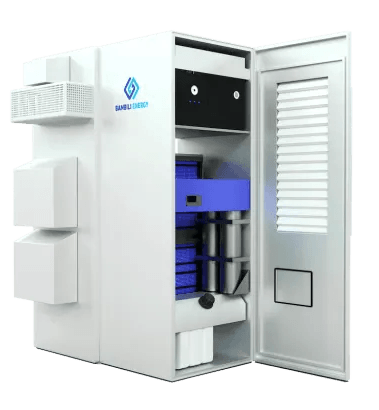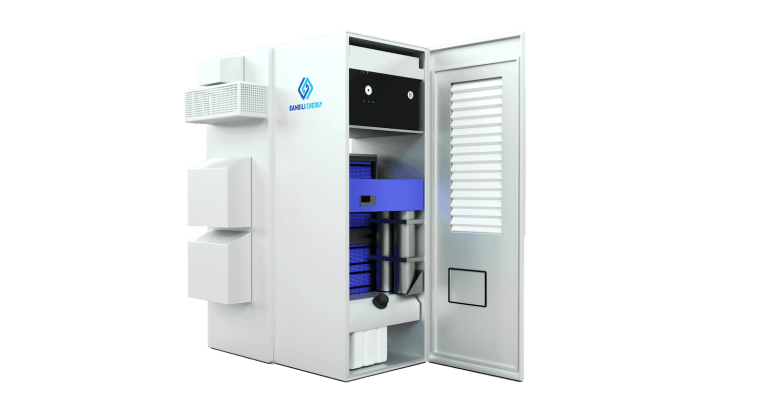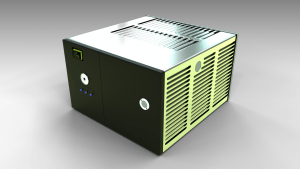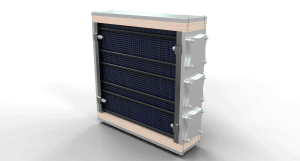Energy
Bambili Energy Hydrogen Fuel Cells
High Efficiency
Hydrogen used in fuel cells is highly efficient compared to internal combustion engines (diesel and petrol generators).
Low Production Costs
Hydrogen and methanol are cheap to produce and can be made from a large range of accessible feedstock such as biomass, fossil fuels, natural gas and recycled carbon dioxide, which make production less affected by price fluctuations.
Eco-Friendly
Complete combustion of hydrogen produces significantly less greenhouse gases and other toxic chemicals than fossil fuels.
Why Fuel Cells?
Fuel cell technology is cleaner than generators, quickly scalable, easily serviced and available now.
The fuel cell system features catalytic start-up, enabling fast start-up and minimum power consumption in standby and during the start-up process. It incorporates a fuel cell stack and a reformer enclosed in an outdoor cabinet with auxiliaries, such as fuel tank and power distribution using hydrogen as its fuel source.
It can also use a safe and economical methanol-water blend as feedstock. This enables high power density and fuel energy density, which results in a highly energy efficient system, due to reuse of waste heat from fuel cell in the reformation process. Methanol is converted to hydrogen by the reformer unit.
- Industry & High Power ConsumersDescribe the item or answer the question so that site visitors who are interested get more information. You can emphasize this text with bullets, italics or bold, and add links.
- Power for BusinessDescribe the item or answer the question so that site visitors who are interested get more information. You can emphasize this text with bullets, italics or bold, and add links.
- Residential Power SolutionsDescribe the item or answer the question so that site visitors who are interested get more information. You can emphasize this text with bullets, italics or bold, and add links.
- Power for Retail & CommercialDescribe the item or answer the question so that site visitors who are interested get more information. You can emphasize this text with bullets, italics or bold, and add links.
- Power for Government BuildingsDescribe the item or answer the question so that site visitors who are interested get more information. You can emphasize this text with bullets, italics or bold, and add links.
- Power for Remote SitesDescribe the item or answer the question so that site visitors who are interested get more information. You can emphasize this text with bullets, italics or bold, and add links.
Scaled to Your Needs
Modular and Scalable
Bambili Energy’s fuel cell systems use hydrogen to generate power, they are modular in design and they offer flexible configuration options for deployment.
The MRFC5000 is a 5 kW power system based on a single 2-metre tall cabinet with a footprint less than 1 square metre.
For larger power requirements users have the option of upgrading to a power solution of more than 100 kW. The modular system can be scaled up to grid power output, with power output determined by the number of units.
Users also have the option of containerising the systems in standard shipping containers.
Applications
- Scalable up to grid power production levelDescribe the item or answer the question so that site visitors who are interested get more information. You can emphasize this text with bullets, italics or bold, and add links.
- Suitable for small to medium sized industrial useDescribe the item or answer the question so that site visitors who are interested get more information. You can emphasize this text with bullets, italics or bold, and add links.
- Battery / GenSet replacementDescribe the item or answer the question so that site visitors who are interested get more information. You can emphasize this text with bullets, italics or bold, and add links.
- Telecom sitesDescribe the item or answer the question so that site visitors who are interested get more information. You can emphasize this text with bullets, italics or bold, and add links.
- Ideal for remote sites and industrial usageDescribe the item or answer the question so that site visitors who are interested get more information. You can emphasize this text with bullets, italics or bold, and add links.
- Suitable for use at homes / compounds / estatesDescribe the item or answer the question so that site visitors who are interested get more information. You can emphasize this text with bullets, italics or bold, and add links.
- Off-grid continuous and backup powerDescribe the item or answer the question so that site visitors who are interested get more information. You can emphasize this text with bullets, italics or bold, and add links.
- Airfield lightingDescribe the item or answer the question so that site visitors who are interested get more information. You can emphasize this text with bullets, italics or bold, and add links.
- Government and municipal applicationsDescribe the item or answer the question so that site visitors who are interested get more information. You can emphasize this text with bullets, italics or bold, and add links.
- Medical facilities and hospitalsDescribe the item or answer the question so that site visitors who are interested get more information. You can emphasize this text with bullets, italics or bold, and add links.
- PV energy extenderDescribe the item or answer the question so that site visitors who are interested get more information. You can emphasize this text with bullets, italics or bold, and add links.
- Rail signallingDescribe the item or answer the question so that site visitors who are interested get more information. You can emphasize this text with bullets, italics or bold, and add links.

All Rights Reserved | TOGIT



